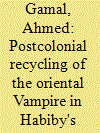| Srl | Item |
| 1 |
ID:
126357


|
|
|
|
|
| Publication |
2013.
|
| Summary/Abstract |
Although today's undergraduates may not have considered the implications of class struggle, they are generally well-versed in the intricacies of vampire lore. This article outlines how the vampire metaphor can serve as a valuable pedagogical tool for introducing students to fundamental concepts in Marxist thought. As opposed to the supernatural vampires featured in Stoker's Dracula or Meyer's Twilight saga, this approach treats capitalism as a form of economic vampirism-with the capitalist taking on the role of the vampire and the worker relegated to its prey. The article further extends the vampire metaphor and demonstrates how it can be used to teach the Marxist perspectives on class conflict, alienation, and false consciousness.
|
|
|
|
|
|
|
|
|
|
|
|
|
|
|
|
| 2 |
ID:
116667


|
|
|
|
|
| Publication |
2013.
|
| Summary/Abstract |
This article examines Emile Habiby's Saraya, The Ghoul's Daughter (1991) and Bharati Mukherjee's Jasmine (1989) as two postcolonial novels seeking to rewrite the history of Palestinian and Indian diaspora according to their respective myths of Oriental vampires. Habiby's recycling of the Palestinian folktale of the ghoul and Mukherjee's recuperation of the Hindu myth of Lord Shiva aim to spotlight the classical vampiric topoi of otherness, unspeakableness, foreignness, and border existences in colonial and postcolonial contexts. Postcolonial Gothic writing is thus shown to foreground gender, nationality, and ethnicity as sites of both power conflict and cultural exchange. Adopting a counter-Orientalist approach, the study sheds light on the different strategies these two postcolonial texts employ to deconstruct the demonic and ghostly constructions of Arabs and Indians.
|
|
|
|
|
|
|
|
|
|
|
|
|
|
|
|